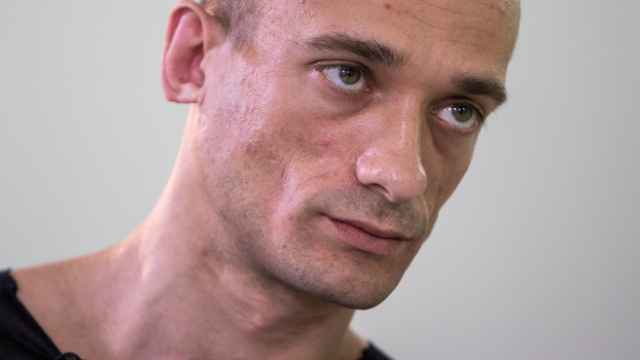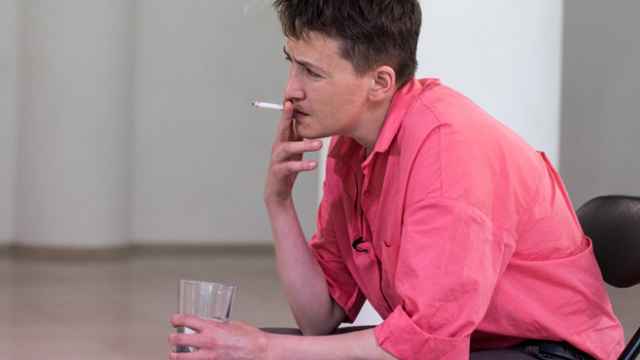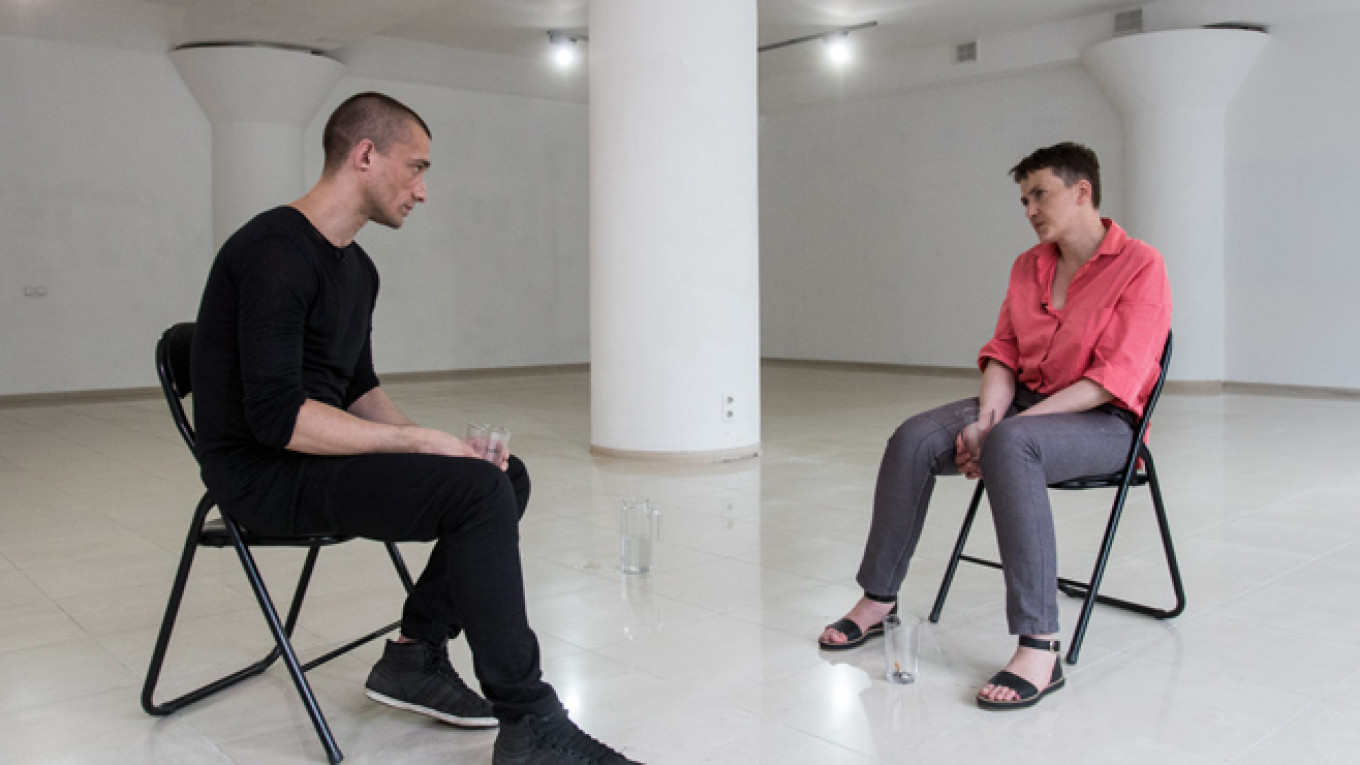A few short years ago, the anarchic Russian artist Petr Pavlensky and regimented Ukrainian military pilot Nadiya Savchenko inhabited different worlds. But revolution, war, art and prison have brought their lives together. Both are now seen as heroes by their followers. Both are demonised by the Russian government and Russian nationalists. And both have plenty to say.
Kiev provided the perfect stage for a meeting of minds — a conversation that was initiated and organized by the independent Ukrainian broadcaster Hromadske TV. The following are edited and excerpted highlights from a longer discussion.
Nadiya Savchenko (S): A person is always the same — whether free or in prison. If I become a deputy in parliament, that doesn't mean tomorrow I won't go and jump off a bridge into the Dneipr with my clothes on in the same way I did before. Prison doesn't change a person. It breaks them, makes them harder, but what was in them still remains. As for what a "hero" is — that I don't know.
Pyotr Pavlensky (P): Heroism, in my view, is the same as calling yourself a victim. Heroism is suffering. If a person finds himself in prison, he isn't a victim because of that.
S: Of course not. After all, he didn't chose to go to prison. Heroes make a conscious decision to die for an idea. You also consciously decided to go out and protest. I consciously rose to the defense of my homeland, but I ended up in prison by chance. I was abducted. I'm not sure you can call that heroism.
People love to attach labels and tags. They wrote to me in prison: "Don't hunger strike, fast instead! Then our great Ukrainian martyr will be on the conscience of [Russian Orthodox Church head] Patriarch Kirill." I sat and listened to that, and thought, God, they've found a martyr. I don't like that sort of thing.
P: The bad thing is that in this way, they cut you off. I am a part of society. And when people pick a name for me they separate me from society. Were you in Lefortovo?
S: No. I was in typical Moscow detention centers. To me they weren't prisons, they were monasteries. The devil's monasteries. I didn't feel that life. I heard, of course, the prisons at night. But I couldn't even scream.
P: But four walls …
S: My arm wouldn't fit though the holes in the grill. It's just two dead years. Your body always shackled, maddening numbness, switching off your mind so as not to lose your wits. That's what two years of solitude is.
P: For me it was different. There is literal prison and the prison of the everyday — it's the same lack of freedom, enchaining people.
S: Working from 9 to 5 — it's the same prison.
P: There's more space, but in prison the lack of space is compensated by an excess of time. But I was in constant conflict with the prison administration. I wonder how you dealt with this. You're a military person after all. I am always moving from order to freedom, to unpredictability. Freedom is unpredictability of action. And prison is a military garrison with a hierarchical system — at the bottom are the arrested.

S: You perceive prison as an alternative reality. If I had been guilty, I would have perceived prison normally. But for me it is lost time, because my country was at war. I couldn't act.
Prison order is quite similar to army order. The difference is that there is no police arrogance in the army. They don't order your life. In prison people are treated like trash. The first thing I did in prison was not to allow myself to be treated that way. I never turned to face the wall. I was fine with the order — get up at 6, lights out at 10, make the bed. In the army it's the same. Only in the army there is movement. You have to work. And [in prison] you just have to sit on the stool or lie on the bed. For me that was savagery. The same with other things: you can't turn the lights on or off yourself, they say, suddenly, "hands behind your back." And I say to them, "What the hell for?"
P: All these "Hands behind your back!" "Face the wall!" "Do this, do that!" One time I heard the guard say "Don't look at me!"
S: Yes, or, say I was walking, they'd say "Don't look at her!" In the army, you have the right to appeal an order if you think it is criminal. In prison, you're just a slave. But they understood straight away that I wouldn't accept that, and nobody really forced me. There were some decent guards. The most pleasant thing that happened was when a woman, who was just about to retire, wrote me a note and left it in my cell during a search, even though it was forbidden to talk to me. "I support you, all the best" was what she wrote.
P: From my experience, only about one in ten of the filth were okay.
S: I counted more. Where I was, I think about two out of 10 were bad. Maybe that was just me.
P: There was a lot more propaganda stacked up against you. You were a hostage at a time of war. Terrorist groups came to Ukraine and started a war.
S: And it was hard to watch Russian television. Until then, I had not come across such shameless propaganda. Where I come from, channels can at least fight against each other. And here they just tell you how to pray to an icon.
P: How many people were in your cell?
S: I was alone for two years. Do you know how the investigator explained that? You're a Banderite, a Nazi, they could kill you in prison. I said: "Aside from you, vile man, nobody can kill me. I will find a common language with all the rest of the prisoners."
P: Did you spend the whole two years on your own?
S: They told me that people slash their wrists on the fourth month, so as not to sit in solitary confinement. But I just couldn't imagine that it could be any other way. When I was in the psychological ward, also alone, you could meet girls in the kitchen, in the toilet, during cigarette breaks or walking breaks.
P: When I was in the psychological ward, they also tried to keep me in solitary confinement. And they also tried to use other convicts as an excuse.
S: They also said that the isolation was for my own sake. Once, they took me out to the yard outside, where there were former prison employees. They were all against Ukraine and all that. They asked me: "Why Maidan? Why did you need to start a war." An hour into the conversation, they shouted: "Glory to Ukraine! Glory to the heroes!"
After that, they blocked me from seeing anyone. And when they escorted me on New Year's Eve, the girls were shouting "Nadezhda, Happy New Year! Hang in there!" from all the windows.
P: After any protest, they can arrest me or do whatever they want to me. They could, if they wanted, say my protest was in support of animal rights, or North Korea, or whatever. How can you fight it? This is why I write texts. I'm at war but on another field, a symbolic one.
S: Everyone chooses their own war. People should fight on all fronts — let's not call this a war.
P: Not to agree, not to take it as it is, not to take it for granted.

"A person is always the same — whether free or in prison," says Nadiya Savchenko.
S: The court hearings, by the way, were a joy for me. Did you have court hearings?
P: I had two court cases, simultaneously. One for the St. Petersburg case. I organized my own Maidan in St. Petersburg. We brought in tires at eight a.m. — like the Maidan. And, on the bridge where the Narodovoltsi [19th-century revolutionaries] assassinated Alexander II, we did a Maidan. It was a Maidan of five people. And a court case was opened because of it. I was the only defendant.
S: And where were you tried?
P: In Moscow
S: I always enjoyed coming to court after being on my own.
P: They usually sit you together in the police van.
S: I was always alone in police vans. And always in a separate convoy.
P: You had it harder. I was in an isolation ward for only 10 days.
S: They tried to scare me with an isolation ward too. I asked them what that would change. I mean, I'm already in prison, already on my own. The prison guards would come up to me and tell me that my fate is decided by Vladimir Putin. I'd tell them — "thank you very much, but my fate is decided by God alone — the same as Putin's for that matter." I alone decided whether to live or not to live. I didn't need any life in Russia. There was no choice, no compromise to be made. What kind of a compromise could there be when they have taken everything away from you? When they have taken their freedom away from you?
P: Here is no place here for compromises.
S: How could I sell my idea down the road? I'm Ukrainian. I was born a Ukrainian and I will die a Ukrainian.
I judge for myself. Today they throw me flowers; tomorrow it might be stones; and the day after I might be burned at the stake. I am ready to accept it all — I'm ready to go my own way. Just like you.
P: I'm grateful to everyone who wrote me letters. Because this support pushes back the walls of your prison cell. I answered nearly everyone who wrote to me.
S: I also answered all the letters. I didn't know what to do with the rest of my week.
You were asking me what people can do for [Ukrainian filmmaker Oleg] Sentsov and [activist Alexander] Kolchenko. Just look at what my sister did for me. She kicked open doors. She showed how you don't abandon your own.
People tell me it must be difficult for the guys left behind/ I think they are the ones who have it easy. They still have hope that they'll be released. But, you know, this happens only when the whole world fights for you, and you are ready to die at any moment. If you betray your beliefs, if you start whimpering and begging, if you go around asking for pardons, then the world isn't going to fight for you. So I wish our boys resilience. If they stay resilient, all of them will get out.
P: Sentsov and Kolchenko are prisoners of war.
S: Everyone taken during spring 2014, and anyone who was part of this Ukrainian operation was a prisoner of war.
I found it amusing. If it was a military tribunal, I'd have understood the language. But here — nothing. Now you have a new group being targeted in the Crimean Tatars. I think what they are doing is genocide. They are annihilating an entire people, just because they are undesirable elements as far the authorities are concerned.
P: Its not the first year this has happened, of course. It was not a coincidence that I did my "Freedom" action at the place of Alexander II's assassination. His reign was marked by the brutal suppression of liberation uprisings in Ukraine, Poland, Lithuania, Belarus and Chechnya. Nothing has changed: it was imperial chauvinism then, and it is imperial chauvinism now.
I think that the apolitical nature of Russian society today is criminal. It is aiding and abetting the Kremlin. It's exactly what the Kremlin needs.
S: Do you think the Russian people are betraying themselves by agreeing to this?
P: Of course.
A Message from The Moscow Times:
Dear readers,
We are facing unprecedented challenges. Russia's Prosecutor General's Office has designated The Moscow Times as an "undesirable" organization, criminalizing our work and putting our staff at risk of prosecution. This follows our earlier unjust labeling as a "foreign agent."
These actions are direct attempts to silence independent journalism in Russia. The authorities claim our work "discredits the decisions of the Russian leadership." We see things differently: we strive to provide accurate, unbiased reporting on Russia.
We, the journalists of The Moscow Times, refuse to be silenced. But to continue our work, we need your help.
Your support, no matter how small, makes a world of difference. If you can, please support us monthly starting from just $2. It's quick to set up, and every contribution makes a significant impact.
By supporting The Moscow Times, you're defending open, independent journalism in the face of repression. Thank you for standing with us.
Remind me later.


